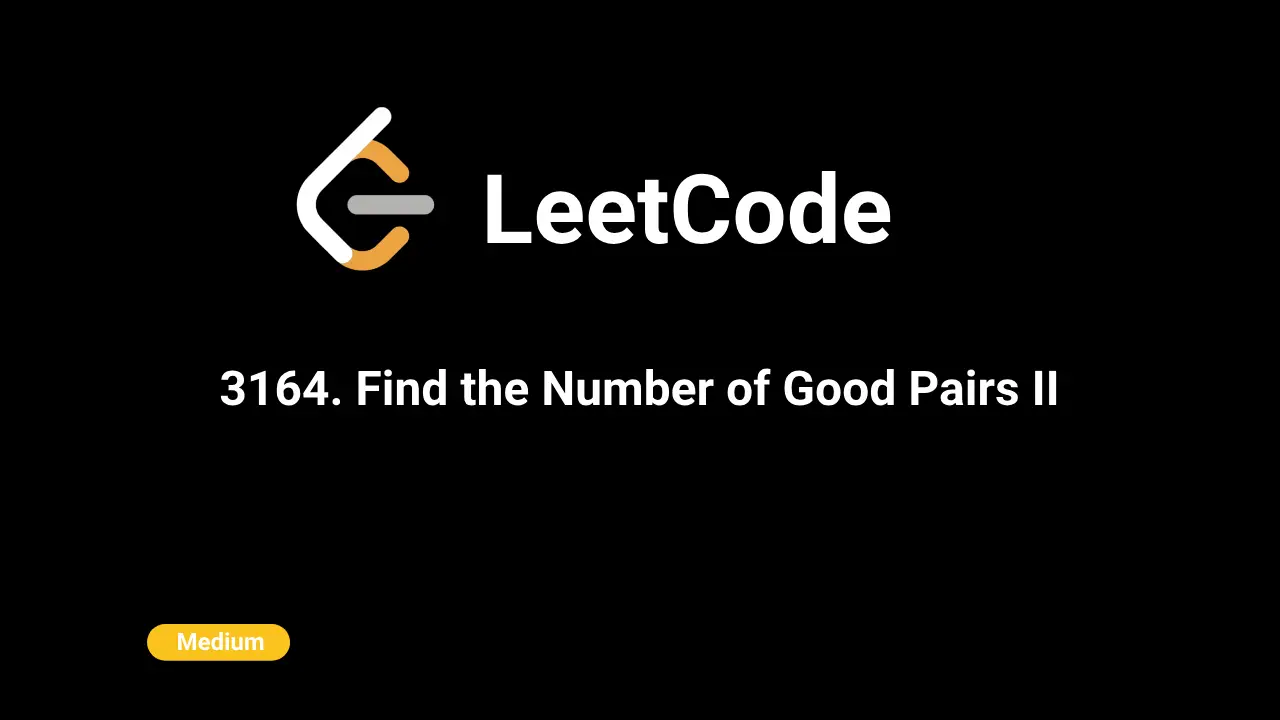Dare2Solve


To find the total number of good pairs, we need to iterate through the elements of both arrays and check for pairs that satisfy the given condition.
nums1 and nums2.nums1 and populate map1 with the frequencies of elements that are divisible by k.nums2 and populate map2 with the frequencies of elements.map1 and for each key, iterate through its divisors.map2, increment the result by the product of the frequencies of the corresponding elements in both maps.O(n * sqrt(max(x))) where n is the length of nums1, and max(x) is the maximum value in nums1.O(n + m) for the maps map1 and map2.class Solution {
public:
long long numberOfPairs(vector<int>& nums1, vector<int>& nums2, int k) {
unordered_map<int, int> map1;
unordered_map<int, int> map2;
for (int x : nums1) {
if (x % k == 0) {
int f = x / k;
map1[f]++;
}
}
for (int x : nums2) {
map2[x]++;
}
long long res = 0;
for (const auto& [x, y] : map1) {
for (int i = 1; i <= sqrt(x); ++i) {
if (x % i == 0) {
int cur = x / i;
if (map2.find(i) != map2.end()) {
res += static_cast<long long>(map2[i]) * y;
}
if (cur != i && map2.find(cur) != map2.end()) {
res += static_cast<long long>(map2[cur]) * y;
}
}
}
}
return res;
}
};
class Solution:
def numberOfPairs(self, nums1: List[int], nums2: List[int], k: int) -> int:
map1 = defaultdict(int)
map2 = defaultdict(int)
for x in nums1:
if x % k == 0:
f = x // k
map1[f] += 1
for x in nums2:
map2[x] += 1
res = 0
for x, y in map1.items():
for i in range(1, int(math.sqrt(x)) + 1):
if x % i == 0:
cur = x // i
if i in map2:
res += map2[i] * y
if cur != i and cur in map2:
res += map2[cur] * y
return res
class Solution {
public long numberOfPairs(int[] nums1, int[] nums2, int k) {
Map<Integer, Integer> map1 = new HashMap<>();
Map<Integer, Integer> map2 = new HashMap<>();
for (int x : nums1) {
if (x % k == 0) {
int f = x / k;
map1.put(f, map1.getOrDefault(f, 0) + 1);
}
}
for (int x : nums2) {
map2.put(x, map2.getOrDefault(x, 0) + 1);
}
long res = 0;
for (Map.Entry<Integer, Integer> entry : map1.entrySet()) {
int x = entry.getKey();
int y = entry.getValue();
for (int i = 1; i <= Math.sqrt(x); ++i) {
if (x % i == 0) {
int cur = x / i;
if (map2.containsKey(i)) {
res += (long) map2.get(i) * y;
}
if (cur != i && map2.containsKey(cur)) {
res += (long) map2.get(cur) * y;
}
}
}
}
return res;
}
}
/**
* @param {number[]} nums1
* @param {number[]} nums2
* @param {number} k
* @return {number}
*/
var numberOfPairs = function (nums1, nums2, k) {
var map1 = new Map();
var map2 = new Map();
nums1.forEach((x) => {
if (x % k === 0) {
var f = x / k;
map1.set(f, (map1.get(f) || 0) + 1);
}
});
nums2.forEach((x) => {
map2.set(x, (map2.get(x) || 0) + 1);
});
var res = 0;
for (var [x, y] of map1) {
for (var i = 1; i <= Math.sqrt(x); ++i) {
if (x % i === 0) {
var cur = x / i;
if (map2.has(i)) res += map2.get(i) * y;
if (cur !== i && map2.has(cur)) res += map2.get(cur) * y;
}
}
}
return res;
};
func numberOfPairs(nums1 []int, nums2 []int, k int) int64 {
map1 := make(map[int]int)
map2 := make(map[int]int)
for _, x := range nums1 {
if x % k == 0 {
f := x / k
map1[f] = map1[f] + 1
}
}
for _, x := range nums2 {
map2[x] = map2[x] + 1
}
var res int64 = 0
for x, y := range map1 {
for i := 1; i <= int(math.Sqrt(float64(x))); i++ {
if x % i == 0 {
cur := x / i
if count, ok := map2[i]; ok {
res += int64(count * y)
}
if cur != i {
if count, ok := map2[cur]; ok {
res += int64(count * y)
}
}
}
}
}
return res
}
public class Solution {
public long NumberOfPairs(int[] nums1, int[] nums2, int k) {
Dictionary<int, int> map1 = new Dictionary<int, int>();
Dictionary<int, int> map2 = new Dictionary<int, int>();
foreach (int x in nums1) {
if (x % k == 0) {
int f = x / k;
if (map1.ContainsKey(f))
map1[f]++;
else
map1[f] = 1;
}
}
foreach (int x in nums2) {
if (map2.ContainsKey(x))
map2[x]++;
else
map2[x] = 1;
}
long res = 0;
foreach (var entry in map1) {
int x = entry.Key;
int y = entry.Value;
for (int i = 1; i <= Math.Sqrt(x); ++i) {
if (x % i == 0) {
int cur = x / i;
if (map2.ContainsKey(i))
res += (long)map2[i] * y;
if (cur != i && map2.ContainsKey(cur))
res += (long)map2[cur] * y;
}
}
}
return res;
}
}
The provided solution efficiently computes the total number of good pairs given two integer arrays nums1 and nums2 along with a positive integer k. By utilizing maps to store the frequencies of elements in both arrays and iterating through the keys to find valid pairs, the solution achieves a time complexity of O(n _ m _ sqrt(max(x))) and a space complexity of O(n + m), where n is the length of nums1, m is the length of nums2, and max(x) is the maximum value in nums1. This approach effectively handles the problem's constraints and provides an optimal solution.